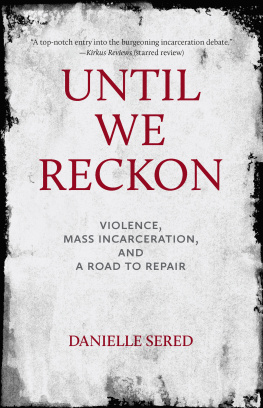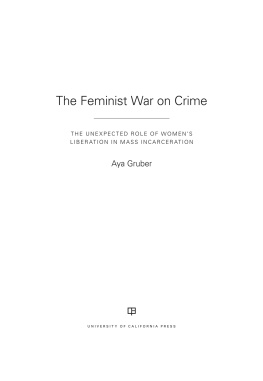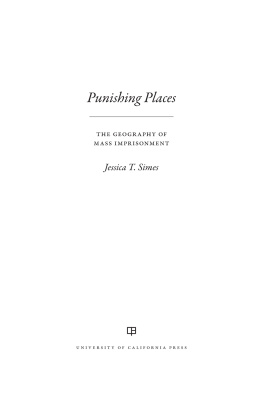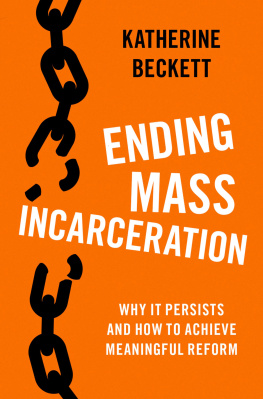Contents
Page List
Guide

UNTIL WE RECKON
UNTIL WE RECKON
VIOLENCE, MASS INCARCERATION, AND A ROAD TO REPAIR
DANIELLE SERED
2019 by Danielle Sered
All rights reserved.
No part of this book may be reproduced, in any form, without written permission from the publisher.
Requests for permission to reproduce selections from this book should be mailed to: Permissions Department, The New Press, 120 Wall Street, 31st floor, New York, NY 10005.
Published in the United States by The New Press, New York, 2019
Distributed by Two Rivers Distribution
ISBN 978-1-62097-479-7 (hc)
ISBN 978-1-62097-480-3 (ebook)
CIP data is available
The New Press publishes books that promote and enrich public discussion and understanding of the issues vital to our democracy and to a more equitable world. These books are made possible by the enthusiasm of our readers; the support of a committed group of donors, large and small; the collaboration of our many partners in the independent media and the not-for-profit sector; booksellers, who often hand-sell New Press books; librarians; and above all by our authors.
www.thenewpress.com
Funding generously provided by the Art for Justice Fund, a sponsored project of Rockefeller Philanthropy Advisors.
Book design and composition by Bookbright Media
This book was set in Bembo and Centaur
Printed in the United States of America
10 9 8 7 6 5 4 3 2 1
And the walls became the world all around.
Maurice Sendak
We can make America what America must become.
James Baldwin
Contents
UNTIL WE RECKON
Introduction
As a teenager, sleeping on a friends couch, I woke up one night to the sound of the bullets stopping. There was a time once when I would have awakened to them starting, but that was long beforebefore the level of violence in Chicago went through the roof, before the crack epidemic, before mass incarceration. And of course, in a way I didnt fully understand yet, it was also after. After slavery, after Jim Crow, after Martin and Malcolm were shot, after redlining, after Nixon, after the founding of our country on the bones of the people who lived here before, after years and years and years of talking about anything other than what came before.
By the time I came of age in Chicago in the 1980s and early 1990s, America had long become a country where violence was normal. That normalization was not a blip in our history, however hard a period that was for urban centers in particular. Rather, it was an expression of our values and historyand of what those values and that history had produced. It was tempting to think of the pain and loss in that time and place as an exception, but it wasnt one. It was the rule.
It is an American habit to try to solve problems apart from their context. We like baseball and apple pie and the flag and not talking about the past. We praise optimism and ingenuity and self-reliance and we repeat our history over and over again. We talk about liberty and equality and the pursuit of happiness and we cannot or will not break down the barriers to equal access for all. We are often beautiful and usually stubborn and sometimes brave and our homes and our neighborhoods and our country are racked with violence that we do not deserve and that is entirely ours.
Sometimes I think of America not as a place or a nation, but a promise. It is the only way I can continue to love this country. The notions of equality and liberty that are meant to define us and bind us can only truly be ours if we understand them as a destination to which we are relentlessly headed, not a station we have already reached. I think James Baldwin was right (as he usually was) when he wrote, American history is longer, larger, more various, more beautiful, and more terrible than anything anyone has ever said about it. This may be particularly true of the history of our national relationship to violence. But despite the persistence of violence as a defining feature of our culture, I continue to believe we can become a country that makes violence our shared enemy and begins the work of eradicating it. I continue to believe in our chances of finding and choosing the road from the America we are to the America we still have a chance of becoming. I believe our chances of doing so will depend on our ability to look squarely and honestly at what we have done and what we are doing and to choose to do something different instead. This book aims to be an imperfect, useful tool in our shared work to do just that.
One thing is certain about the problem of violence: we will never solve it through incarceration. That is in part because incarceration is an inadequate and often counterproductive tool to transform those who have committed violence or protect those who have been harmed. It is neither the most effective way to change people nor the most effective way to keep people safe. Its standing in society is based largely on its role in protecting people from violence and those who commit it, but as a violence intervention strategy, it fails to deliver the outcomes everyone deservesat great human and financial cost. Increasingly, this message is being sounded not only by justice reformers, but by crime survivors as well.
Incarceration is also limited as a tool because it treats violence as a problem of dangerous individuals and not as a problem of social context and history. Most violence is not just a matter of individual pathologyit is created. Poverty drives violence.
In the United States, many policies have in fact nurtured violence, by exacerbating the very things that foster it, including poverty, instability, substandard education, and inadequate housing.
Not only does incarceration fail to interrupt these drivers, it intensifies theminterrupting peoples education, rendering many homeless upon return from jail or prison, limiting their prospects for employment and a living wage, and disrupting the social fabric that is the strongest protection against harm, even in the face of poverty. On the individual level, violence is driven by shame, isolation, exposure to violence, and an inability to meet ones economic needsfactors that are also the core features of imprisonment. This means that the core national violence prevention strategy relies on a tool that has as its basis the central drivers of violence.
Nearly all poor communities bear the brunt of policy choices that have nurtured violence. In communities of color, the detrimental impact of these policies is amplified by historical and present injustices. These harms trace back to colonization, continued with slavery and its more proximate counterpart, convict leasing, morphed into Jim Crow, and persist in countless forms, including the more recent phenomenon of redliningthe practice of refusing loans or insurance to people because they live in areas deemed to be poor financial risksa practice applied almost exclusively in communities of color.
Mass incarceration also fails to solve the problem of violence because it is a response that treats violence as a matter of good vs. evil. The reality is far more complicated. Nearly everyone who commits violence has also survived it, and few have gotten formal support to heal. But just as it would be wrong to excuse peoples actions simply because they were previously victimized, it is also wrong to ignore someones victimization because the person previously broke a law or committed harm. Such a response to violence reinforces the notion that some people deserve to be hurt: the exact thinking about violence that we have to uproot if we are to end it.








